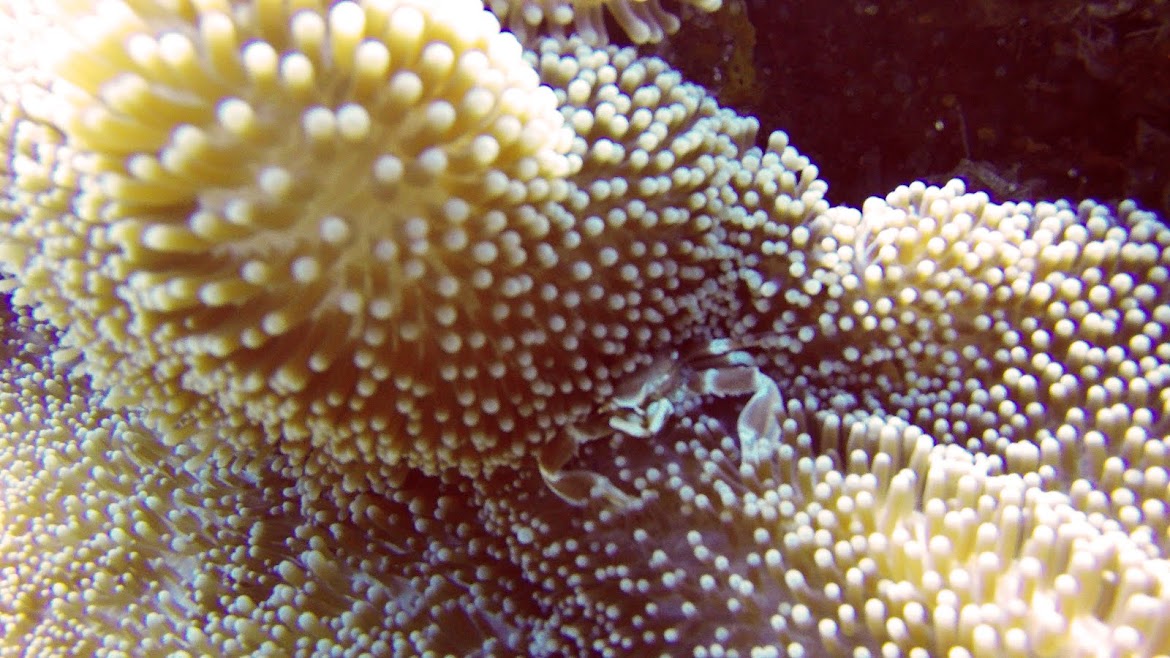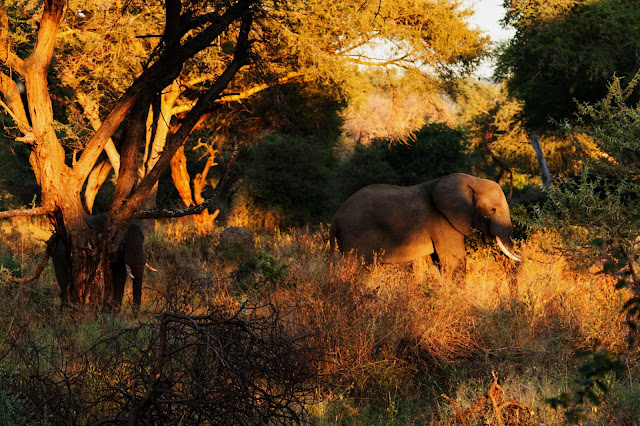Di notte tutto assume un’altra
forma, un altro significato.
 |
| Sunset @Mdonya Old River Camp - Ruaha National Park - Tanzania - ©Andrea Pompele All Rights Reserved |
Anche e soprattutto nel bush.
La notte cala improvvisamente, in
un quarto d’ora, venti minuti al massimo ed è buio pesto. Ti ritrovi in un
posto completamente diverso da quello a cui sei abituato, con regole diverse,
abitanti diversi e ti rendi rapidamente conto che sei una nullità nelle
tenebre.
Le notti che partono silenziose
sono le migliori, riservano sorprese improvvise. Noi ci si annoia mai e presto
si realizza quanto queste siano pericolose. Non si può camminare in giro per il
campo da soli di notte. Primo perché non ci sono luci, ad eccezione delle
lampade a kerosene davanti alle tende, secondo perché questa è molto popolata e
bisogna essere accompagnati sempre da un maasai fino alla propria tenda.
Potrebbe esserci un elefante o più che tranquillamente strappa le foglie da un
ramo o dall’erba, oppure qualcos’altro. non si sa mai.
 |
| Genet cat camera trap - Ruaha National Park - Tanzania - ©Andrea Pompele All Rights Reserved |
Abbiamo diversi amici notturni
che ci vengono a fare visita quando cala la notte, c’è un topolino che si
presenta in ufficio sempre alla stessa ora, dal soffitto di paglia scende fino
ad incontrare un ramo e sale rapidamente sul tronco dell’albero di acacia di
fianco a noi. Si chiama Gerald the mouse. Abbiamo una genetta che vive nel
campo, si aggira furtiva di notte e la si può incontrare anche la mattina
presto, una sera davanti al fuoco l’abbiamo vista salire sull’albero di fronte
a noi. Si chiama Janet, la Genetta. Ok la fantasia non è il nostro forte, va
bene. Scusate.
Spesso durante la notte sento
camminare sopra il tetto della mia tenda e far cadere delle cose, mi sono
chiesto le prime volte cosa poteva essere, poi ho visto due luminosi occhi
gialli fissare la mia torcia ed ho subito realizzato che dalla posizione
frontale e dalla grandezza doveva per forza trattarsi di un primate: un Galagone, meravigliosa proscimmia strepsirrina della famiglia dei galagidi, che abita gli alberi del campo, ce ne sono
parecchi in giro e si nascondono tra il fogliame. Da primatologo non posso che
osservarli con un certo interesse anche se magari la smettessimo di svegliarmi
sempre passeggiando sulla tenda, non è che mi offendo, va bene eh?
 |
| Spotted Hyena camera trap - Ruaha National Park - Tanzania - ©Andrea Pompele All Rights Reserved |
Ci sono iene che attraversano il
campo e cercano costantemente di accedere alla cucina per divorare qualcosa,
girano fra le tende e il suono della loro voce è piacevole nonostante non siano
esattamente gli animali più belli da vedere, hanno però il loro fascino. Una
notte si aggiravano davanti alla mia tenda e mi hanno svegliato di soprassalto
per la loro famosa “risata” di gruppo, fortissima e vicinissima. Qui le iene
sono per lo più scavengers, cioè pulitori più che predatori, si cibano di
carcasse e di tutto quello che trovano piuttosto che cacciare, dipende dalla
quantità di leoni presenti nella zona, che è piuttosto elevata, e modificano le
loro abitudini alimentari per trarne il profitto maggiore. Addentano e
masticano di tutto, compresa la camera trap che abbiamo fissato ad un albero,
che mostra chiari segni di sofferenza dovuti all’attenzione di una iena
particolarmente interessata. Una notte abbiamo fissato la fotocamera e abbiamo
notato che dalle foto la prospettiva cambiava, l’ha girata con i denti e l’ha
orientata in modo diverso, devo dire che la visuale è migliorata parecchio
anche, si vede che l’inquadratura non le piaceva e ha cambiato visuale. Altro
che direttori della fotografia.
 |
| Young female leopard camera trap - Ruaha National Park - Tanzania - ©Andrea Pompele All Rights Reserved |
Abbiamo ovviamente i leoni che
ruggiscono la notte e si aggirano per il campo, ma non sono gli unici predatori che abbiamo
intorno, ce ne sono di più piccoli, ma altrettanto temibili. Lo zibetto ad
esempio, o civetta africana (Civecttitis civetta), lo so che state pensando ad
un uccello, ma no non si tratta di quello, bensì di un viverride piuttosto
comune. “un viverride? E che cavolo è?” assomiglia ad un orsetto lavatore tanto
per prenderla piuttosto a spanne, Dio se mi sentisse il prof di zoologia mi
strapperebbe la laurea…
C’è il Serval o Gattopardo
(Leiptalurus serval) che ha abitudini sia notturne che diurne, piuttosto comune
da queste parti, un felino dalle gambe lunghe ed affusolate molto elegante, dal
manto maculato, spietato predatore di uccelli.
C’è poi il felino, anzi
pantherino, più elegante e bello di tutti, il leopardo. La nostra camera trap
ne ha ripreso un esemplare femmina mentre beveva alla pozza, ma non è l’unico
leopardo residente che abbiamo in zona, c’è Fundi, il maschio dominante che
abita nel campo, o meglio che decide di farsi vedere solo quando interessa a
lui ovviamente. Una meraviglia da osservare.
Se vi è piaciuto questo articolo allora potreste essere interessati a lasciare un commento, oppure a leggere anche questi altri:
I LEONI RUGGISCONO DI NOTTE
IL VIAGGIO
At night everything takes on another form, another meaning.
Especially in the bush.
Night falls suddenly, in a quarter of an hour, twenty
minutes at the maximum and then it is pitch
dark. You find yourself in a completely different place from what you're used
to, with different rules, different habitants and you realize quickly that you
are a nothing in the darkness.
The nights that start out quiet
are the best nights, they are the nights that possess sudden
surprises. We never get bored and soon realizes how dangerous they are. You can
not walk around the area alone at night. First, because there are no lights
except for kerosene lamps in front of the tents, and secondly because it’s very populated and you
must always be accompanied by a Maasai up to your tent. There might be an
elephant quietly ripping leaves from a branch or grass, or something else. You
never know.
We have several friends that come to visit us at night, there is a little mouse who is in office , climbing from the thatched ceiling down until it meets
a branch and rises rapidly to the trunk of the acacia next to us. We called him
Gerald the mouse. We have a Genet living in the camp, she goes around furtively
at night and you can also spot her in the early morning. One evening
around the fire we saw her climb the tree in
front of us. Her name is Janet, the Genet. Ok imagination is not our best
issue, ok. Sorry.
Often at night I hear something
walking on the roof of my tent and dropping things, I wondered what could it be the first few times, then I saw two bright
yellow eyes staring my flashlight and I quickly realized from the front position and size that it was bound to be a primate: a bushbaby,
wonderful prosimian strepsirrina family of galagidi who
inhabit the trees, there are several around hiding
among the foliage. As a primatologist, I can observe them with interest but
please maybe you can stop walking on the roof of my
tent!
There are hyenas crossing the camp and constantly seeking
access to the kitchen to eat something, running between the tents and the sound
of their voice is pleasant although they are not exactly the most beautiful
animals to see, however they have their charms. One night they were loitering in front of my tent and I woke up because
of their famous "laughter" of the group, strong and close. Here
hyenas are mostly scavengers, ie cleaners rather than predators, feeding on
carcasses and anything they find rather than
hunting due to the amount of lions in the area,
which is quite high, and they change their
eating habits to derive greater profit. Snapping
and chewing at everything, including the camera trap
which we set up in a
tree which showed clear signs of distruction due
to the particular attention of an overly curious
hyena. One night we checked the camera and
noticed that the perspective of the photos had
changed, he had turned it
with his teeth and oriented it differently. I must say that the view was improved a lot, we see that
he did not like the angle of the shot so he changed it. What a director
of photography!
We have of course the lions roaring at night and roaming the camp, but they are not the only predators
that we have around. The other predators are
smaller but equally as dangerous. Civet for example,
African Civet Cat (Civecttitis civetta), a rather common viverrid. "A
viverrid? And what the hell is? "Looks like a raccoon just to take it
easy, OMG If my Professor of Zoology would hear me he will burn my graduation
...
There is also the Serval (Leiptalurus serval) that habits
both day and night, quite common in these parts, a very
elegant and slender cat with long legs, a spotted coat and a ruthless
predator of birds.
Then there is a cat, indeed pantherino, the most elegant and beautiful of all, the leopard.
Our camera trap has captured a female specimen
as she drank from the pool, but she is not the
only resident leopard that we have in the area. There is Fundi, the dominant
male who lives in the camp, or rather he decides to show himself only when he’s
interested in doing so, obviously. A wonder to behold.
If you like this post maybe you can read also these ones:
LIONS ARE ROARING AT NIGHT
THE TRIP
THE END OF AN ADVENTURE











